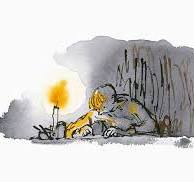Riddley Walker (book review)

This book is hard to read. The language insists on calling attention to itself, so no stars for “ease” or “comfort”. But I can’t imagine a more effective way of insisting on the fragility, vulnerability of language. Riddley Walker, the narrator, speaks and writes an English of the distant future, a language spoken by people who are struggling to stay alive — a primarily oral culture with a few exceptions. Riddley lives in Kent, one of the English “home counties” that surround London. Today, Kent is sometimes called “the garden of England,” It boasts the city and cathedral of Canterbury, the destination of those colourful pilgrims in Chaucer’s Tales, marking a milestone in the evolution of English. But two millennia after some devastating event — presumably a bomb — has laid waste to a highly developed civilization, the atmosphere seems always dark and wet and dangerous. “Canterbury” has become “Cambry”.
The story begins as Riddley turns 12, at which point he is apparently considered an adult. This coincides with his father’s death in a grim accident at work — the work of recovering huge, heavy pieces of metal buried in the muddy ground. From the first sentences we share Riddley’s ignorance about what has actually happened and what is likely to happen next. We can’t be sure who is friend and who is foe. We learn the quasi-religious story that is told and retold among his immediate group about the splitting of the shining man, and begin to guess that the story, presented to groups of people by means of puppets in a makeshift theatre, is adjusted often in the interests of maintaining control of the audience.
We soon begin to appreciate Riddley’s intelligence, resourcefulness and intense desire to understand his situation. I, for one, wondered how or where he learned to read, to say nothing of writing, and how he came to sense some kind of obligation with respect to other people, perhaps most apparent in his drive to record what happens to him. And many things happen to him. It is, at heart, an adventure story.
It is reasonable to ask whether this book, published more than 40 years ago, has dated. Yes, and no, I think. On the one hand, I suspect many of us once — perhaps in the 1980s — supposed nuclear conflict might end in massive, but not complete obliteration of human beings, and that survivors like Riddley would develop some way of living in the ruins. Today we’re probably more likely to imagine our species becoming extinct, the planet having become uninhabitable. On the other hand, Hoban has plausibly projected what might happen to English when bastions of literacy crumble — legal, scientific, academic and editorial. It makes the book a memorable achievement, reading difficulties notwithstanding. Suddenly, it doesn’t seem so much about the distant future as the here and now, about, say, what users of Tik Tok make of the language of Shakespeare.


